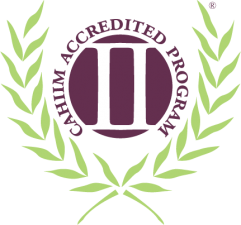Health Information Technology - Curriculum
The Health Information Technology curriculum provides individuals with the knowledge and skills to process, analyze, abstract, compile, maintain, manage, and report health information.
Students will supervise departmental functions; classify, code, and index diagnoses and procedures; coordinate information for cost control, quality management, statistics, marketing, and planning; monitor governmental and non-governmental standards; facilitate research; and design system controls to monitor patient information security.
Graduates of the degree program may be eligible to write the national certification examination to become a Registered Health Information Technician (RHIT). Employment opportunities include hospitals, rehabilitation facilities, nursing homes, health insurance organizations, outpatient clinics, physicians’ offices, hospice, and mental health facilities.
With the American Health Information Management Association (AHIMA) required experience, graduates of the coding diploma and coding certificate programs of study may be eligible to write the “CCS” (Certified Coding Specialist) and/or the “CCS-P” (Certified Coding Specialist-Physician based) mastery level coding specialist examinations. Employment opportunities without one of these coding certifications are limited to entry-level positions. Therefore, students are encouraged to continue their education and complete the degree to receive the full benefits of this growing healthcare field.
All programs of study are offered completely online with the exception of three clinical courses which are completed at assigned health care agencies.
Earn a Bachelor’s Degree
Edgecombe Community College’s HIT Associate in Applied Sciences (AAS) degree prepares students for various entry-level roles in health information technology. Your HIT AAS degree can be the first step in your professional and educational journey. Graduates of the two-year AAS HIT degree at Edgecombe Community College interested in pursuing their bachelor’s degree in health information management may be eligible to apply to the Health Information Management Bachelor’s degree at ECU in preparation for leadership roles.
ECC has an articulation agreement with ECU, allowing students who complete an AAS degree in HIT at ECC to enter ECU as a junior upon acceptance to the ECU HIM Program. Admission to the Health Information Management Program is competitive. A completed application does not guarantee admission to the program.
For more information, contact Nacole T. Everette at everetten@edgecombe.edu or (252) 618-6624.

